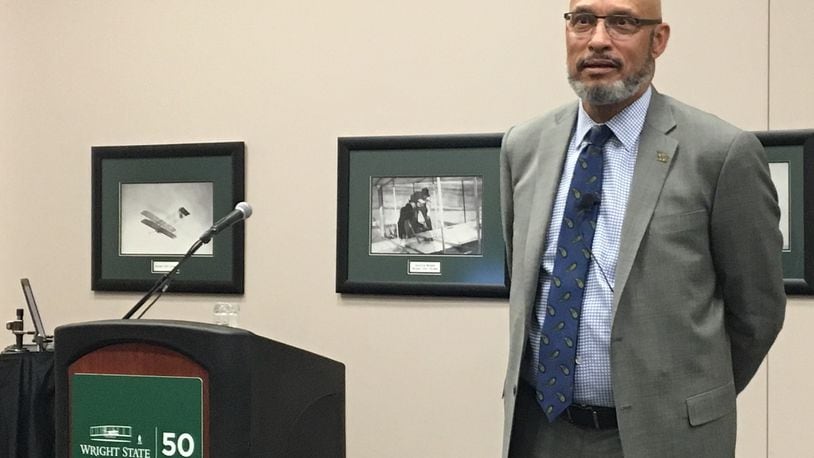Shields, who hails from the University of Wisconsin-Platteville, spoke about his time in higher education and shared how some personal experiences have shaped him as an administrator and person.
Shields shared that he lived in an orphanage for five years as a child and he said that as the leader of a university he thinks he should “always be scanning the horizon” for what’s coming next.
Shields will be on campus through Saturday and he will be followed by two more candidates who will visit campus next week.
Here are three takeaways from Shields’ forums with students, faculty and staff on Thursday morning:
1. Diversity on college campuses is important to him
Shields advocates for serving “the under-served” more in higher education.
He was one of the defendants in the 2003 U.S. Supreme Court case, Grutter v. Bollinger, that addressed the use of affirmative action in graduate admissions at the University of Michigan Law School. The University of Michigan won the lawsuit in a five to four decision.
“We won that lawsuit, in part because of implementation that I was involved in,” said Shields, who served as assistant dean and director of admissions at the university’s law school.
Shields also talked about his personal experiences with racism. Just recently, he said someone pulled into his driveway and started playing “Dixie,” a song that was once known as the national anthem of the Confederacy during the Civil War.
2. Wright State’s budget issues would be a top priority
Wright State’s budget woes came up several times in the forum.
“It’s not going to be fun. It’s going to be challenging at times,” Shields said. “We have to be willing to take that on. I’m willing to.”
Shields dealt with budget issues at UW-Platteville caused by a decrease in state funding. He said he had to cut around $8.5 million from his most recent budget. Balancing Wright State’s budget will require some changes, Shields said.
“We’re not going to be able to do things the same,” he said “The funding streams aren’t the same.”
3. Working with students and faculty
Making sure students are successful means “we want to make sure everybody is trained to get a job when they leave school,” Shields said.
Shields said he would try to make sure students are kept safe from the dangers of alcohol abuse and campus sexual assault.
He also spoke to faculty members and said he had a desire to work closely with them if he serves as Wright State’s next president. He told faculty and staff that he sees it as his responsibility to take the blame when things go badly and to offer credit to people when things go well.
He also spoke to the need to keep good faculty at Wright State.
“If you aren’t able to retain talented faculty then the whole enterprise can go silent,” Shields said.
5 HIGHER ED MUST READS
• UD student gives back to the hospital that saved his life
• Dan Rather, at Wright State, calls out Trump on alternative facts
• Area international students fear they won’t be let back in U.S. if they visit families
• Local professor, a son of refugees, protests Trump’s executive order
• Millennials are getting married later in life to focus on careers after college
About the Author
